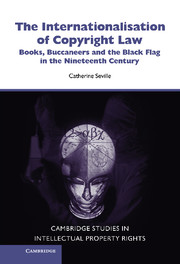 The Internationalisation of Copyright Law
The Internationalisation of Copyright Law Book contents
- Frontmatter
- Contents
- Table of cases
- Table of statutes
- Table of abbreviations and archive sources
- Acknowledgements
- 1 Introduction
- 2 International copyright: four interconnected histories
- 3 Towards the Berne Union
- 4 Colonial challenges
- 5 The independence of America
- 6 Domestic problems
- 7 The colours of cyberspace
- Bibliography
- Index
5 - The independence of America
Published online by Cambridge University Press: 25 July 2009
- Frontmatter
- Contents
- Table of cases
- Table of statutes
- Table of abbreviations and archive sources
- Acknowledgements
- 1 Introduction
- 2 International copyright: four interconnected histories
- 3 Towards the Berne Union
- 4 Colonial challenges
- 5 The independence of America
- 6 Domestic problems
- 7 The colours of cyberspace
- Bibliography
- Index
Summary
You steal Englishmen's books and
Think Englishmen's thought,
With their salt on your tail your wild
eagle is caught;
Your literature suits its each whisper
and motion
To what will be thought of it over
the ocean
Independence is one of the great themes of American history. The history of copyright in America reflects this. Having first to develop her own domestic copyright law, America had then also to consider international copyright. There was much resistance to giving copyright to ‘foreigners’. America's interaction with Britain over the matter was understandably coloured by their previous history, and the charged relationship between the two nations meant that feeling on both sides was strong and passionate. The argument that America needed her own literature and culture, rather than that of other nations, was put forward early. However, not everyone was persuaded that international copyright protection was a necessary element in achieving this. America's publishing trade grew rapidly until it supplied a huge market of eager readers, and short-term economic interests could be more compelling than long-term contribution to nationhood. Although eventually national self-confidence grew to the point that copyright could be conceded to everyone, trade pressures ensured that an element of compromise remained in America's international copyright law until almost the end of the twentieth century.
America's publishing trade – origins and opportunities
America's first press was shipped over from England, and set up in Cambridge, in the Massachusetts Bay Colony. The first work from the press was the Freeman's Oath (1638).
- Type
- Chapter
- Information
- The Internationalisation of Copyright LawBooks, Buccaneers and the Black Flag in the Nineteenth Century, pp. 146 - 252Publisher: Cambridge University PressPrint publication year: 2006


